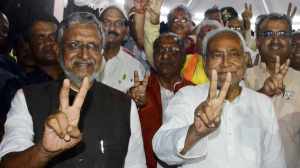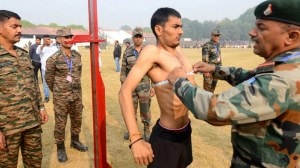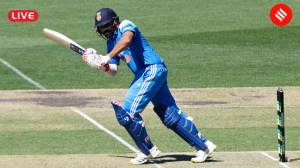In Nepal twist, Maoists ready to support the govt they fought
As the King of Nepal moved decisively to take charge of the country’s affairs—clamping down on the media and replacing the police ...

As the King of Nepal moved decisively to take charge of the country’s affairs—clamping down on the media and replacing the police with Nepal Army soldiers outside the homes of political leaders placed under house arrest—the Maoists gave the situation a new twist.
Till yesterday, they were painted as villains of the piece and New Delhi had hoped that political parties and the monarchy would join hands to take them on. Today, the Maoists tried to raise a common front against King Gyanendra as they offered to join hands with the same political forces they had been fighting till now.
Signed by Communist Party of Nepal (Maoist) leader, Prachanda, their statement appealed to different parties and groups ‘‘to create a storm of countrywide rebellion’’. It added: ‘‘We would like to clarify at this juncture that our party is prepared to establish a broad front with all those who are against feudal democracy.’’
Ignoring the threat, the King set about emphasising his own imprint on how the country will be run. While sidelining the political parties and arresting their leaders, he announced a 10-member Cabinet—all royalists—who will work under his chairmanship.
However, a day after he indicated that he would represent Nepal at the SAARC meet in Dhaka, the two-day summit was postponed with New Delhi pulling out. While this ploy seems aimed at ensuring that Gyanendra doesn’t get immediate legitimacy, indications are that India will remain firmly engaged with the Palace.
In fact, New Delhi has made it clear that its decision not to go to SAARC was not because it is unwilling to share the stage with the King. ‘‘We have gone to SAARC summits in the past and shared the platform with various leaders of different political persuasions,’’ Foreign Secretary Shyam Saran said.
The idea, however, is to let the dust to settle so that talks can be initiated with the monarchy as well as the political parties.
Right now, that seems difficult. All communication links have been snapped. At least 13 leaders were taken away by the Army and another 28 were reportedly placed under house arrest. In some cases, sources said, soldiers moved into the houses of political leaders, snatched their mobile phones and snapped their telephone connections to isolate them.
The same armoured personnel carriers and minesweepers that Nepal received from India as part of the assistance package to counter the Maoists are now seen on streets of Kathmandu as part of the new crackdown.
However, flights to Kathmandu were restored today with Indian Airlines operating the first flight out of New Delhi around noon today. While the ATC hotlines are still not operational, sources said, a flight crossing Varanasi was able to make contact with Kathmandu ATC which confirmed that planes were being allowed to land and depart from the airport.
Still, Jet Airways and Air Sahara cancelled their flights.
Meanwhile, although he has cracked down on politicians, the King remains fully aware that he will have to rely on the support of the common man. He has promised to make foodgrains more easily available and there is talk of soft loans for local development.
New Delhi has still not contacted Kathmandu as it waits for the situation to unfold. However, Kathmandu has taken the first step. Nepal’s Army chief, General Pyaar Jung Thapa has invited India’s new Army chief J J Singh to visit Kathmandu.



- 01
- 02
- 03
- 04
- 05




























